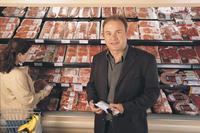
“This is my personal opinion, and I feel it very strongly,” says Dr. Dan Hurnik, Industry Chair for Swine Research at the Atlantic Veterinary College at UPEI. “We have a responsibility as researchers to create knowledge. I think that knowledge should first help the people and industry of this region.”
The pork industry on Prince Edward Island has suffered in the last few years for a number of reasons. Canada’s dollar has increased in value, making our pork more expensive for international trade. Cost of production is higher in the Maritimes than in other parts of the country, mostly due to the high price of shipping both feed and pork. The global recession also hit at a time when unfounded fears about swine flu made consumers avoid pork.
“The last pork-processing facility on PEI closed about two years ago,” adds Hurnik. “These are tough days for pork farmers.”
Tough days, but the industry goes on. While export of pork products as food has all but vanished, the Island’s export of breeding stock has increased. Much of that can be attributed to research done at AVC.
“We’ve developed a monitoring system for the health status of Island pigs,” says Hurnik. “It began more than ten years ago when we performed an Island-wide survey of the herd. We found we could make a number of claims that make us stand out, including the fact that we’re free of a couple of diseases that affect pigs in the rest of the country. And, as an Island, we can create guidelines to keep it that way.”
Many of the Island’s sales of breeding stock go to Russia, where Hurnik says the industry is hungry for the strong genetic lines our pigs can boast.
“Russia used to supply most of its own pork from its own farms,” explains Hurnik. “When communism fell, imports of meat products to Russia skyrocketed. In the last few years, the country has become much more concerned about its long-term food security, and has imposed tariffs on imports. To rebuild the domestic herd, the Russians need genetically strong breeding stock.”
Hurnik explains this new market of breeding stock will never replace what was lost in PEI’s meat production. But, he says, building up this side of the industry can only help meat production.
“You go to your local supermarket today, and meat is pretty generic. You don’t know where it comes from. You don’t know how it was raised,” says Hurnik. “Well, some people care about that information now. I don’t think we’re too far from a time when people demand locally grown meat. Especially if you can show some sort of health benefit about the pork itself.”
For this reason, says Hurnik, he is hopeful about the future of the pork industry on the Island.